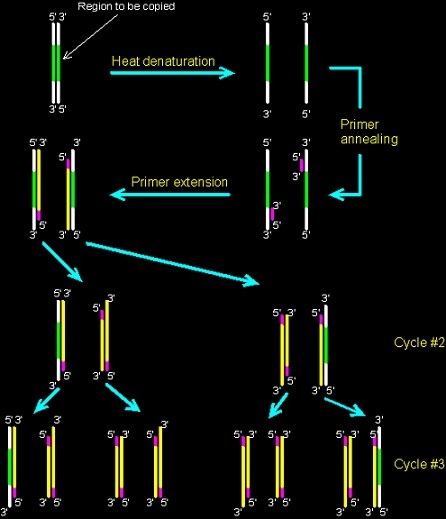Polymerase Chain Reaction Assignment Help
Polymerase Chain Reaction
This is a molecular biology technique, which is use to amplify one or more copies of piece of DNA up to various order of magnitude of a particular DNA sequence. It is a automatic process, which required bacteria for amplification of DNA. PCR includes the series of 20-40 repeated temperature changes, which called cycles, and each cycle having 2 to 3 different temperatures steps. The cycle is always started by one temperature step, called hold, which is higher temperature greater than 90 degree, and followed by one hold and at the stage of extention temperature is 72 degree and at last it is 4 degree.
Each cycle have 3 step PCR: a) Denaturation at 94 to 96 degree celcius, b) primer annealing at 45-60 degree celcius, c) extention 72 degree celcius.
Temperature: Its used and the time duration both are depends on various parameters, that means enzymes which is used in DNA synthesis, In reaction, concentration of divalent ions and dNTPs, and also melting temperature of primer. Melting temperature, at which half of DNA starnds are double-helical state and half in random coil state. Due to presence of hydrogen bonds, melting temperature depends on both length and nucleotide sequence.
Steps Of The Cycle:
Initialization Stage: Heating of reaction with temperature 96 to 98 degree celcius for 1-10 minutes. This is only needed for DNA polymerase reaction, which require for heat activation through hot-start PCR.
Denaturation stage: It is first regular cyclic event with heating of reaction to 94-98 degree celcius for 20-30 seconds. Because of this, melting of DNA template through disrupting the hydrogen bond within their bases, and the result is single-stranded DNA molecules.
Annealing step: In this step, reaction temperature is going down to 50-60 degree celcius, and time duration is 20-60 seconds for single stranded DNA. Ideally the annealing temperature is 3-5 degree celcius. When the primer sequence is closely matched to the template sequence, then the hydrogen bond between DNA-DNA is very strong and stable. And for DNA synthesis, polymerase will bind to the primers-template.
Extention Stage: Temperature is depends on used DNA polymerase. The new DNA strands forms after synthesization of DNA polymerase, and new one is complementary to the DNA template strands by adding dNTPs in 5' to 3' direction. Extention time depends on both the length of DNA polymerase and DNA fragments. By the rule, at its maximum temperature, DNA polymerase gives 1000 bases per minuet after polymerization.
Application Of PCR: a) In DNA fingerprint analysis, b) Analysis of ancient DNA from fossils, c) Genome mapping, d) Isolation of particular gene of interest from selected samples, e) Probes generations, f) Sequencing of DNA production, g) Detection of microbial genes for finding pathogenesis, h) Gene mutation, i) Microorganism detection, j) Diagnosis of monogenic disease.
Polymerase Chain Reaction Assignment Help By Online Tutoring and Guided Sessions at AssignmentHelp.Net


Email Based Assignment Help in Polymerase Chain Reaction
To submit Polymerase Chain Reaction assignment Click here.
Polymerase Chain Reaction Help | Polymerase Chain Reaction Homework Help | Polymerase Chain Reaction Biotechnology | Polymerase Chain Reaction Fair Help | Polymerase Chain Reaction Project Help | Help For Polymerase Chain Reaction | Help Polymerase Chain Reaction | Help On Polymerase Chain Reaction | Polymerase Chain Reaction Help Online | Help With Polymerase Chain Reaction Homework | Polymerase Chain Reaction Fair Project Help | Polymerase Chain Reaction Help Me | Polymerase Chain Reaction | Kids Biology Help | Help In Polymerase Chain Reaction | Polymerase Chain Reaction Projects Help | Help With Polymerase Chain Reaction | Homework Help For Polymerase Chain Reaction | Online Tutoring


